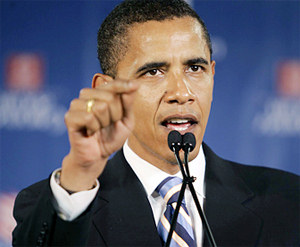Gaddafi, Ahmadinejad cast shadow on UN summit
 New York - US President Barack Obama's vow of a "new era of engagement" stood in stark contrast to United Nations speeches by two long-time rogues of the international community: Libyan leader Moamer Gaddafi and Iranian President Mahmoud Ahmadinejad.
New York - US President Barack Obama's vow of a "new era of engagement" stood in stark contrast to United Nations speeches by two long-time rogues of the international community: Libyan leader Moamer Gaddafi and Iranian President Mahmoud Ahmadinejad.
Just minutes after Obama left the podium at the UN General Assembly, Gaddafi rose for his own first-ever speech to the chamber.
Gaddafi condemned the world's major powers, labeling the UN Security Council the "terror council" and slamming every decision it has made in the last 50 years.
Famous for long and rambling discourses, Gaddafi spoke for 90 minutes - far beyond the 15 minutes allotted world leaders. The UN General Assembly president, the only official with the power to cut a speech short, is Ali Abdussalam Treki, a Libyan former foreign minister.
In the evening, Ahmadinejad accused Israel of subjecting the Palestinians to "genocide" and praised his own "glorious" election over the summer. The speech prompted many delegations, including the United States, to walk out of the assembly hall.
Ahmadinejad has appeared regularly at the UN during his presidency but was under added pressure this year after a disputed election over the summer prompted weeks of bloody protests.
The speeches of Obama, Gaddafi and Ahmadinejad served as a reminder of the wide gulf between the 192 member states that make up the United Nations.
Obama's greeting at the United Nations stood in stark contrast to the cool reception given his predecessor, George W Bush. Obama sought to channel that new warmth by calling for other countries to act on "mutual interest" and take on greater responsibility.
Even Gaddafi called Obama a "son of Africa" and quipped that he hoped Obama would stay US president "forever."
A few thousand people protested both Gaddafi and Ahmadinejad's visits in a heavily guarded area a couple of blocks from the headquarters of the United Nations.
Protestors held up signs of political prisoners and criticized the United Nations for inviting the two leaders to New York. They said there was nothing the two leaders could have said in their UN speeches that would change their minds.
"We don't have any hope. We don't have any expectation from Ahmadinejad," said Abbas Tehrani, a 59-year-old Iranian now living in Denver, Colorado. "He's not the president of Iran."
Iran dominated global diplomacy on the day.
Russian President Dmitri Medvedev, who met with Obama on the sidelines of the UN gathering, suggested he was open to further sanctions against if Tehran did not take the "right direction" in coming clean on its nuclear activities.
Foreign ministers of the United States, China, Russia, France, Britain and Germany met to prepare for a key meeting with Iranian officials on October 1. The group would consider its "next steps" if the talks did not yield a "serious response" from Iran.
Ahmadinejad made no mention of the nuclear issue in his speech.
Gaddafi was making his first visit to the United States since he took power in a 1969 coup. Even before his visit, the Libyan leader caused a stir in New York over attempts to set up his famous Bedouin tent, which he brings on foreign visits.
Local New York politicians lodged heavy protests. Libya was rejected by city officials from setting up the tent in New York's Central Park, as well as in a Libyan compound in next-door New Jersey and a suburban New York town.
Gaddafi has tried to close the gap with the international community in recent years by disavowing nuclear weapons and paying billions of dollars in reparations for past state-sponsored terrorist acts. The actions led to a resumption of diplomatic ties with the United States in 2006.
But that goodwill was dampened after the release this summer of the man convicted of bombing a Pan-American flight in 1988 over Lockerbie, Scotland.
Libyan intelligence agent Abdel Basset al-Megrahi, who was released by Scotland on compassionate grounds because of a terminal illness, received a hero's welcome on his return to Tripoli. (dpa)